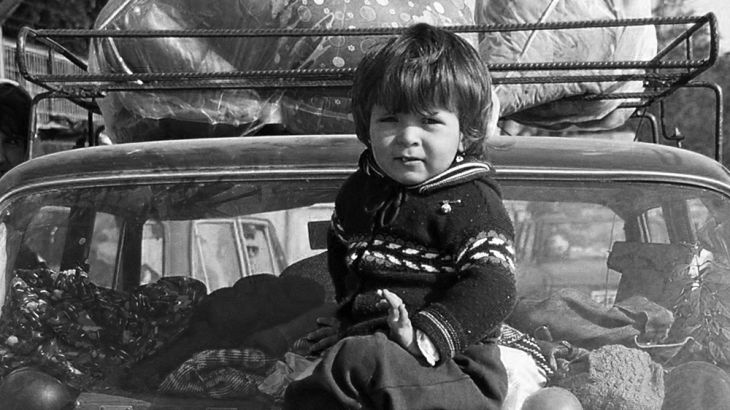
Bulgaria, My Land
Bulgaria’s ethnic Turkish community, persecuted and even deported last century, continues its fight for recognition.
![Kadir Usman, a teacher, acutely remembers the brutal assimilation policy under the Communist regime [Al Jazeera]](/wp-content/uploads/2015/12/9106a4d052304afcb0dee6cfc9036254_18.jpeg)
FILMMAKER’S VIEW
By Yelda Yanat Bagci
Keep reading
list of 4 items‘It feels personal’: Residents fight Melbourne tower block demolition plan
‘Children of the Ganges’ — The boatmen of India’s Varanasi
US senators call on Biden to sanction Sudan’s RSF over human rights abuses
The year 2012 marked the 100th anniversary of the Balkan Wars, and at the time I wanted to make a historical documentary about the wars. But during my research I realised just how little we know about what really happened in Bulgaria during the wars.
I discovered that the issue was much bigger than I initially thought, and that the legacy of the Balkan Wars continues. In November 2012, I travelled 12,000km across Bulgaria and spoke with more than 100 Turkish families who suffered under Bulgaria’s policies towards Turks. Even though we in Turkey live just two hours away, we knew nothing about the pain and suffering of Bulgarian Turks. I spent three weeks speaking with politicians, historians, and families.
I was shocked to learn that they still struggled for their rights and freedoms in 2012. For me, Bulgaria was a European Union country and things should have changed a long time ago. But they had not.
![Bulgarian Turks faced discrimination and persecution in the last century and continue to this day to fight for their rights [Al Jazeera]](/wp-content/uploads/2015/12/a2f3b6a3094a42e28e63f7689f60a0c0_18.jpeg)
The second thing that surprised me deeply was people’s reactions when they learned I was from Turkey. Elderly people cried the moment they heard the word “Turkey”, and the common reaction was people hugging me tightly and shouting “Welcome!”
It was incredible. Even though I’ve been making documentaries for quite a long time now and have been in many countries, this was the most moving experience. And of course my journalistic side began to ask, “Why?” I needed to know why they were acting this way. I was certain that there was a very deep pain behind this.
The more we spoke, the deeper I got into the stories of how they were forced to regret their identity, to forget their mother tongue, to give up their religion and even change their names into Bulgarian ones. Then they took me to their graveyards. This was another shock for me because most of the gravestones were broken or names were scratched on to them.
This happened during the Communist era when Turkish people were forced to change their names. The regime wanted to destroy all the evidence of Turkish identity, so they broke or destroyed all the graves which had Turkish names. It was the first time I realised how important it was for them to keep their names. Some people even died for this.
After three weeks of collecting stories, I came back to Turkey and started to write the script. Meanwhile, I was chasing historians to interview. During my research I kept coming across two names: Justin McCarthy and Kemal Karpat.
Everybody told me it was impossible to get those interviews because they both were living in the US and overbooked, and I was quite late to arrange an interview with them. After weeks of trying I was just about to give up when I remembered it would not be the first time that I had managed an impossible task. People told me it was impossible to film the largest Turkish street gang, which had never been filmed before, but I was able to and I made the documentary 36 Boys.
So I kept trying and after a while fate decided to help me. I got a phone call from one of my journalist friends who knew I was trying to reach McCarthy or Karpat, and he said: “You will not believe who is coming to Istanbul for a conference!” I said: “Kemal Karpat?” He laughed. “They are both coming, my dear.” That was the moment that I was once more sure this film should be made and this story had to be told.

After I interviewed Karpat and McCarthy, we went to Bulgaria in December 2012 to film the rest of the story.
There was a small detail that hit us on the first day: the weather. It was below freezing outside and it was impossible to stand for more than two minutes. Even if you could stand the camera would freeze after a while. It was really difficult for us to get used to the weather and to work outside. We could not work more than three or four hours in the first days.
We stayed in Bulgaria for almost a month and met people who shared their untold stories with us. We witnessed the inner and painful side of the Bulgarian Turks’ history. Most of the time I could not help crying during the interviews and tried to look elsewhere to stop, but then I saw the cameraman and the soundman were also crying. I think this was one of the most sincere, emotional, sad stories I have ever filmed. And more importantly, it was a hidden story, which happened so close to us. As a storyteller I feel proud of delivering this precious story which was entrusted to me.
![Filmmaker Yelda Yanat Bagci is photographed with cameraman Zilan Karakurt as they interview Emel Balikci Sakir in Bulgaria in 2012 [Al Jazeera]](/wp-content/uploads/2015/12/bc810c24def14a3889eeee2e9b31af0e_18.jpeg)